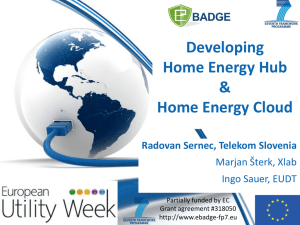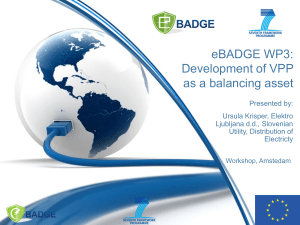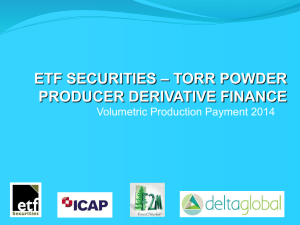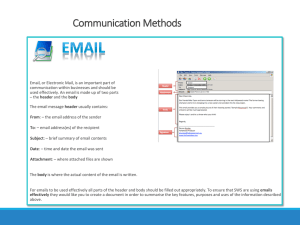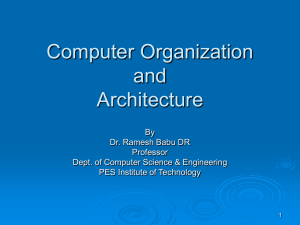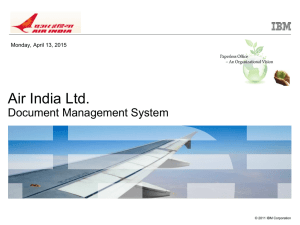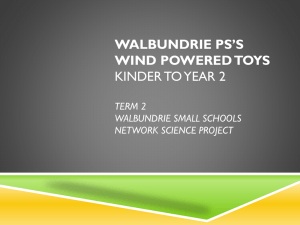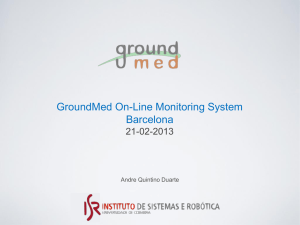TBLM - PointView
advertisement
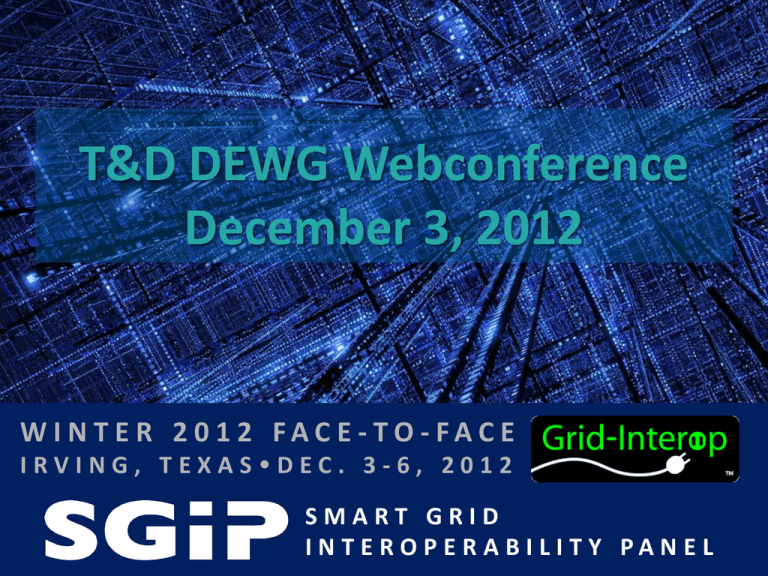
T&D DEWG Webconference December 3, 2012 W I N T E R 2 0 1 2 FAC E - TO - FAC E IRVING, TEXASDEC. 3-6, 2012 SMART GRID I N T E R O P E R A B I L I T Y PA N E L T&D DEWG Meeting Agenda – 12.03.2012 • NIST/SGIP Update – Jerry SG International Cooperation Workshop: Korea & U.S. – December 7, Irving TX SGIP 2.0 PAP12, PAP8/14 Update DRGS Update • TnD DEWG Activities MultiSpeak Catalog of Standards Artifacts – Gary McNaughton • Transmission Bus Load Model (TBLM) (Nokhum Markushevich) • Emerging Topics - Alarms and Event Management over the Smart Grid • Next Meeting – Wednesday, December 17, 4:00 PM Eastern W I N T E R 2 0 1 2 FA C E - T O - FA C E I R V I N G , T E X A S PAP Updates • PAP12 Update IEEE 1815-2010, IEEE 1815-2012 “Standard for Electric Power Systems Communications - Distributed Network Protocol (DNP3)” IEEE 1815.1 “IEEE Draft Standard for Exchanging Information Between Networks Implementing IEC 61850 and IEEE Std 1815 (Distributed Network Protocol - DNP3)” • PAP8 IEEE 61968-3 “Application integration at electric utilities - System interfaces for distribution management - Part 3: Interface for network operations” UML Model of MultiSpeak • PAP14 IEEE C37.239-2010 “Standard for Common Format for Event Data Exchange (COMFEDE) for Power Systems” IEEE PSRC H5 Committee working on guidelines titled; “A common format for configuration of Intelligent Electronic Devices (IED’s)” W I N T E R 2 0 1 2 FA C E - T O - FA C E I R V I N G , T E X A S MultiSpeak Catalog of Standards Artifacts – Gary McNaughton SGIP CoS – Standards Information Form Criteria and Analysis Report: MultiSpeak Specification SGIP CoS - Development Process Statement: MultiSpeak Specification Next Steps W I N T E R 2 0 1 2 FA C E - T O - FA C E I R V I N G , T E X A S UPDATE ON THE USE CASE FOR THE TRANSMISSION BUS LOAD MODEL (TBLM) Nokhum Markushevich Smart Grid Operations Consulting n.markushevich@smartgridoperations.com W I N T E R 2 0 1 2 FAC E - TO - FAC E IRVING, TEXASDEC. 3-6, 2012 SMART GRID I N T E R O P E R A B I L I T Y PA N E L Information Exchange between T&D Domains 6 Distribution domain PMU EMS SE TBLM CA OPF/SCD ED Pre-arm Islanding Restoration ……… RAS SCADA Data Control DSCADA W I N T E R 2 0 1 2 T&G devices FA C E - T O - FA C E I R V I N G , T E X A S Topology model DMS DOMA VVWO FLIR Emerg. apps T&G domains Subst. LTC, Shunts, SVC TBLM Processor AMI processor DER/ES processor DR processor PEV processor Load model Processor Secondary Processor Scenarios for TBLM Use Cases 7 1. 2. 3. 4. 5. 6. 7. 8. 9. 10. 11. 12. 13. Develop aggregated DER capability curves for TBLM Develop aggregated model of dispatchable load for TBLM Develop aggregated real and reactive load-to-voltage dependencies Develop aggregated real and reactive load-to-frequency dependencies Develop aggregated real and reactive load dependencies on Demand response control signals Develop aggregated real and reactive load dependencies on dynamic prices Adapt aggregated real and reactive load models to current weather conditions Develop aggregated real and reactive load dependencies on ambient conditions and time for the short-term forecast of the aggregated load Develop models of overlaps of different load management functions, which use the same load under different conditions. Assess the degree of uncertainty of TBLM component models. Develop Virtual Power Plant (VPP) Model Determine the possible shifting of load from/to the transmission bus Determine the abnormal states of the TBLM after major power system emergencies W I N T E R 2 0 1 2 FA C E - T O - FA C E I R V I N G , T E X A S Develop Virtual Power Plant (VPP) Model W I N T E R 2 0 1 2 FA C E - T O - FA C E I R V I N G , T E X A S Definition of VPP* 9 A virtual power plant (VPP) aggregates the capacity of many DGs, Demand Response, and Energy Storage (Megawatts and Negawatts). VPP creates a single operating profile from a composite of the parameters of each DER that should incorporate the impact of the network on their aggregate output. As any large-scale generator, the VPP can be used to facilitate DER trading in various energy markets and can provide services to support transmission and distribution system management. * Based on “Flexible Electricity Networks to Integrate the Expected Energy Evolution, by J. Corera Iberdrola and J. Maire. W I N T E R 2 0 1 2 FA C E - T O - FA C E I R V I N G , T E X A S VPP model as a component of TBLM 10 Consists of distributed resources from the same transmission bus It is represented, at the distribution-transmission interfaces, as an aggregated profile which includes the influence of the local network on the VPP output. It also represents the composite DER cost and operating characteristics. The model of VPP provides the system operator with visibility of energy resources connected to the distribution network, allowing distributed generation and demand to contribute to transmission system management. VPP can also facilitate the use of distributed resource capacity in the distribution networks , e.g., for FLISR and/or IVVWO. W I N T E R 2 0 1 2 FA C E - T O - FA C E I R V I N G , T E X A S Basic inputs for the VPP 11 DER inputs for the localized (technical) VPP Operating schedule Bids & Offers / marginal cost to adjust position Operating parameters Other inputs: Real-time local network status Loading conditions Network constraints W I N T E R 2 0 1 2 FA C E - T O - FA C E I R V I N G , T E X A S VPP actions based on the input data 12 Commercial VPP 2. Initial model 1. Initial Input Technical VPP 5. Corrections DMS 6. Final model 4. Adjustments to constraints, requests 3. Constraints, requests TBLM 7. Final VPP model & adjusted other components of TBLM . W I N T E R 2 0 1 2 FA C E - T O - FA C E I R V I N G , T E X A S DMS actors involved in VPP modeling for the TBLM 13 DER Data Management System DER model processor Load Model Processor Load Management System Distribution Operation Modeling and Analysis to determine the impact of VPP on distribution operations: adequacy, power quality, efficiency, and operational constraints Integrated Volt/var/Watt control application to determine the impact and availability on Volt/var/Watt optimization Distribution Contingency Analysis to determine the impact on reliability TBLM developer application to adjust other TBLM components. W I N T E R 2 0 1 2 FA C E - T O - FA C E I R V I N G , T E X A S Determine the possible shifting of load from/to transmission bus W I N T E R 2 0 1 2 FA C E - T O - FA C E I R V I N G , T E X A S Narrative 15 For the most of the transmission buses, a portion of the load fed from the bus can be transferred to other busses without violations of the operational limits. Such transfer may change the economics of both transmission and distribution operations (changes of LMPs, losses, of volt/var control benefits, etc.). The efficiencies of these changes may be in conflicts with each other, e.g., the LMPs may reduce, while the losses in distribution can increase. W I N T E R 2 0 1 2 FA C E - T O - FA C E I R V I N G , T E X A S Narrative (cont.) 16 In some cases a reallocation of loads among transmission buses is needed as preventive and even corrective measures in case of a contingency. There may be several alternatives for the shifts of load from one bus to other buses. The alternatives may differ by the amount of load that can be shifted and by the economic and reliability results. The alternatives of load shifting change with the change of the customer loads, DER operations, and current DR statuses. Hence, the available load shifts should be updated in the nearreal time fashion. W I N T E R 2 0 1 2 FA C E - T O - FA C E I R V I N G , T E X A S Objective of the scenario 17 Determine all plausible alternatives of load that can be shifted from/to the transmission bus Provide the EMS with the distribution-side economic and reliability results of the shifts of load To be used by EMS to improve overall efficiency and reliability. W I N T E R 2 0 1 2 FA C E - T O - FA C E I R V I N G , T E X A S DMS actors involved 18 DMS Data Management Systems DMS Topology Model processor DMS multi-level feeder reconfiguration application in shortterm look-ahead study mode to determine all technically feasible alternatives DMS IVVO application to determine the changes in the efficiency of distribution operations under the new configurations DMS contingency analysis for the reconfigured circuits (to assess the change in the reliability) TBLM developer application. W I N T E R 2 0 1 2 FA C E - T O - FA C E I R V I N G , T E X A S Determine the abnormal states of the TBLM after major power system emergencies W I N T E R 2 0 1 2 FA C E - T O - FA C E I R V I N G , T E X A S Narrative 20 After the development of the emergency situation is stopped, and the system is in a quasi-steady-state condition, there are disconnected customers (life-support systems), disconnected DER, and microgrids, activated demand response, disabled demand response means discharged energy storage devices, abnormal volt/var parameters due to IVVWO in emergency mode, abnormal circuit connectivity, etc. All these abnormalities have their prices, constraints, and restoration priorities. W I N T E R 2 0 1 2 FA C E - T O - FA C E I R V I N G , T E X A S Narrative (cont.) 21 Different orders of restoration to the normal states of different components have different impacts on the restoration process. Restoration of some components may impact the states of other components. For instance, restoration of some disconnected loads may reduce the voltage below the limits, which will force the IVVWO to increase the overall voltage and by this to increase the load even more. The cold load pickup should also be determined. Transmission operations in the after-emergency state may also impose constraints on the restoration in distribution, e.g., Reduced loading limits of a transmission interface Limited generation reserve, etc. W I N T E R 2 0 1 2 FA C E - T O - FA C E I R V I N G , T E X A S Objective of the scenario 22 To inform the transmission and distribution control systems about the post-emergency states of the different component in the distribution system to define the appropriate priorities of restoration To take into account the transmission-side constraints for prioritization of distribution restoration. W I N T E R 2 0 1 2 FA C E - T O - FA C E I R V I N G , T E X A S DMS actors involved 23 DMS Data Management Systems DMS Topology Model processor to determine and analyze the after-emergency topology (disconnected elements, abnormal states) Load Model processor (different net load patterns due to backup generators, cold load pickup, etc.) DER Model processor (abnormal states and modes of operations) Load Management System (states of DR) Distribution Operation Modeling and Analysis for after-emergency situational awareness DMS multi-level feeder reconfiguration application in short-term look-ahead study mode to determine the topology restoration alternatives DMS IVVO application to adjust Volt/var/Watt parameters to the restoration alternatives TBLM developer application W I N T E R 2 0 1 2 FA C E - T O - FA C E I R V I N G , T E X A S Conclusions. 24 New object models, attributes, and information exchanges should be developed to accommodate the following transmission and distributing operational needs: Integrating Virtual Power Plants into distribution systems and serving higher-level control areas Shifting of load from one transmission bus to others for transmission operation purposes Restoration of normal operations after major power system emergencies. W I N T E R 2 0 1 2 FA C E - T O - FA C E I R V I N G , T E X A S Future work on TBLM 25 Completion of the development of the TBLM use case Development of a list of possible new object models Development of a list of possible new information exchanges Update of the Distribution Grid Management use cases to accommodate the development and utilization of the TBLM Development of use cases for EMS applications with integration of the TBLM. W I N T E R 2 0 1 2 FA C E - T O - FA C E I R V I N G , T E X A S Thank you! Questions? W I N T E R 2 0 1 2 FA C E - T O - FA C E I R V I N G , T E X A S Emerging Topics - Alarms and Event Management over the Smart Grid IEEE C37.239-2010 “Standard for Common Format for Event Data Exchange (COMFEDE) for Power Systems” W I N T E R 2 0 1 2 FA C E - T O - FA C E I R V I N G , T E X A S Next TnD Webmeeting • Next Meeting – Wednesday, December 17, 4:00 PM Eastern W I N T E R 2 0 1 2 FA C E - T O - FA C E I R V I N G , T E X A S
